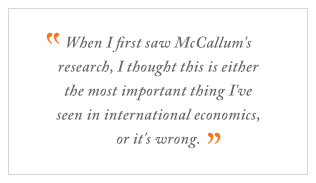John F. Helliwell is one of the world's most prominent economists. In the first part of this two-part interview, he discussed how he has broadened his research from economics into well-being. Here, he offers the types of insights into macroeconomics for which he is renowned -- and his observations refute just about everything we think we know about globalization.
 |
Dr. Helliwell, the Arthur J.E. Child Foundation Fellow of the Canadian Institute for Advanced Research and Professor Emeritus of Economics at the University of British Columbia, has taken an extremely close look at globalization. As he discusses in this interview, much of globalization's reputation is inaccurate -- we aren't an interconnected global village at all. Most trade is extremely local, most people prefer it that way, and there might be a lot more money to be made in your neighborhood than anywhere else on earth.
So for those businesspeople who are worried sick about competing on a global scale, relax. As Dr. Helliwell relates, you might have more to worry about -- and more to gain -- in your own backyard. And for those who lambaste globalization as a curse and threat, simmer down. Your real power is local, and globalization may never be as bad as you think.
GMJ: Are our economies as globalized as we think they are?
Dr. Helliwell: No. We tend to speak and write and think as though trade linkages, people linkages, and capital linkages are as solid globally as they are within countries. I had written and was thinking in that vein myself until fifteen years ago, when I came across a working paper by [Canadian politician and economist] John McCallum, who was making use of data from Statistics Canada after the Free Trade Agreement between Canada and the United States came about.
We already had data in Canada for trade movements among provinces, but the new numbers let McCallum compare the density, strength, and size of trade movements between provinces with those of trade movements between provinces and states. It's called a gravity model because, like the law of gravity, the attraction depends on the proportionality of the masses and the distance.
What McCallum discovered, greatly to his surprise, but even more to the surprise of other people in the economics profession and outside it too, was that trade intensities between Canadian provinces were twenty times as great as those between Canadian provinces and U.S. states.
GMJ: You don't mean somebody going from Toronto to Detroit to buy a Coke and coming back.
Dr. Helliwell: No, this is the actual shipments of goods. This is all the stuff that goes back and forth by trailers and trucks and airplanes. It does include the cross-border shopping, if you like, but that's peanuts compared to trade as we know it, which is wheat being grown in Nebraska and sold wherever it's sold.
The commonly held idea was that goods moved as intensely across national boundaries as they did within a country, yet here was very strong evidence that that wasn't true. The Canada-U.S. Free Trade Agreement of 1989 and its successor, NAFTA, have since affected McCallum's original finding, but local trade is still about ten times more intense. Among the countries of the European Union, which is essentially a single international market, trade is still five or six times greater within the EU countries than between them, in terms of these gravity model intensities.
GMJ: Did you have reservations about McCallum's research? It refutes a lot of what we believed, even ten years ago.
Dr. Helliwell: When I first saw it, I thought this is either the most important thing I've seen in international economics, or it's wrong. I spent half a dozen years trying to decide which. And in the end, I confirmed it, as did lots of other people in a number of ways, and it's starting to change the way people think about markets and international trade. There's a resulting literature building up, and it feeds back in one way or another into the well-being literature and the trust literature that says people carry on their commercial lives in a much more geographically constrained space than we thought they did.
GMJ: Why do people buy things close to home rather than farther away?
Dr. Helliwell: There are a few reasons. One is that people don't need as much variety as economists' models often assume they do. They only go far enough to get what they need. Another reason is that a lot of tastes are local; people actually like things of the sort that are nearby because they're used to them, and the local marketers are more able to spot what local people like and build products that are good for the local tastes, conditions, climate, and so on.
A third reason, which is somewhat more general, is that people have more confidence and faith in dealing with people they know and trust. Networks of personal contacts turn out to be extraordinarily important. Think about walking into a drugstore where the druggist is a friend, and you can simply ask him what you need. But when you go into a strange drugstore, you're by no means sure that they know anything, or are going to take your interests to heart, or won't put you on to the latest patent medicine. A friend will not sell you the Brooklyn Bridge.
GMJ: That sounds like a trust issue, as you've researched.
Dr. Helliwell: There are parallels we've discovered, as we talked about before. [See "Do Your Employees Trust You?" in the "See Also" area on this page.] Trust is important in the workplace, and the same kind of thing governs people's choices of where they trade and who they trade with. People are much more inclined to deal nearby than far away. Their networks are also more likely to be nearby than far away. Having discovered this and saying it was true for trade, we then researched whether it is true for all countries, and for services, for capital movements, and for migration.
 |
GMJ: What did you find?
Dr. Helliwell: We found it was true more or less everywhere. All of the measures we had of intensity and connectedness are all much greater within countries than between countries, and they're all much greater within communities than among communities within a country. Regionalism lives on unheralded.
GMJ: There is an argument that globalization is better for everyone -- that it's the precursor to democracy and raises living standards and material comfort to everyone it touches. Would you agree with that?
Dr. Helliwell: The kinds of things we're talking about are economic as well as social reasons for why people deal close at hand. What the data really say is that it's more costly to go farther away because you might get into risks that you don't know how to handle.
A lot of companies assume that there are pretty big economies of scale and that products made in one country are going to be big winners in some other country. They often find to their discomfort that it's not true -- that by assuming that other people's tastes and systems are like yours, you can end up costing yourself a lot of money. That said, the opportunity to get access to world markets is very important, if what you're selling is really needed.
GMJ: So does local trade have benefits that globalization doesn't have?
Dr. Helliwell: Sure. Think of the environmental impact. It's a la mode to think in this way -- to say "Tell me once again: Why is bottled water shipped across the world when nobody can tell the difference in the water itself?" But economically, a vibrant, quite diverse local community would probably be better insulated against shocks to its main source of livelihood.
GMJ: In that case, do you think government should promote local, interregional trade?
Dr. Helliwell: One of the nice things about most countries is that you don't need internal trade agreements. It is true we have an agreement on internal trade in Canada to break down some of the protectionist constraints that some provinces face, but basically that's pretty small potatoes. It would probably be a messy and not very workable government policy to try to subsidize local trade.
I think the important point is that economic activity is much more local than people thought it was. When some people first see those results, they think of all the gains to trade there would be if we increased international trade until its densities equal that of local trade. And my response is that's probably not the case. The current situation with high density of local versus national trade probably reflects an economic and social equilibrium that's a natural state, and there are good economic reasons for it. It doesn't mean we're passing on major gains from trade, and it doesn't mean we're losing out.
GMJ: Give me an example.
Dr. Helliwell: One way of demonstrating it is this: Suppose it were true that there were a lot of economic gains from getting global trade densities up as high as the intracountry ones are. If that were true, big countries would be much richer than small countries, because small countries are sort of bottled up inside themselves while big countries have much a bigger trading area within their borders.
 |
But if you look across countries, that's not true. The simple correlation between country size and GDP per capita among the OECD [Organisation for Economic Co-Operation and Development] industrial countries is essentially zero, whether or not you include the United States, which is both the biggest and the richest. But it isn't true that the larger economies are richer than the smaller ones.
So that must mean that the gains from additional trade density among the industrial countries, even in terms of income per capita left on the table, are now not very great. That's another way of saying there's probably enough international trade going on already among the industrial countries. Some of the developing countries have clearly made some potential gains from trade, and people argue about what the right pace of that is. If somebody comes in and rips the resources out of the ground and leaves nothing much but corruption behind, then you'd say, "Wait a minute -- that can't be the best way to develop that country."
GMJ: Do the benefits of high-density globalization outweigh the benefits of high-density local trade?
Dr. Helliwell: I think that it will always be the case -- and should always be the case -- that the local densities are higher than the international ones. But would we be better off if international trade densities grew much more relative to the local ones? There's a sense that these research results raise serious questions to the conclusions of both the globalists and the global protestors. Both of them agree that globalization is the norm, but they disagree on whether it's good or bad. This research says that globalization isn't anything as big as either camp thinks it is. And it certainly hasn't got the potential for good that the globalists think it has, and it doesn't remove the scope for local action in the way the protestors believe.
So you want to tell those who are against world trade to put down your placards, get back to your communities, and make them work, because you have lots of capacity locally to create tax rates that differ from other people's, public services that differ from other people's, social organizations that differ from other people's. Go and set them up, and get things right for the people whose lives interest you most.
--Interviewed by Jennifer Robison

